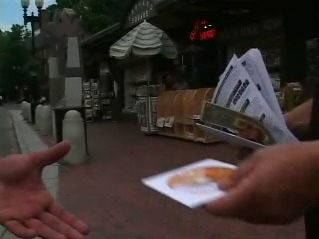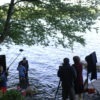
Filmmaking | Internet | Interviews
Blogging: The Arteries of Information
Written by Scott R. Caseley | Posted by: Anonymous
Jason Ong was raised in Nashua, New Hampshire and went on to study Computer Engineering at Rensselaer Polytechnic Institute in Troy, NY. He got involved in this project by way of the Access Coordinator of Cambridge Community Television (CCTV). He set out to produce a piece that would be a coherent story and garner interest.
This project is his first foray into the world of film production. He freely admits that he had experience with digital imagery and computers from his educational background and home use, however not with camcorders. The topic of his documentary was a new area for him to study as well. As Ong put it himself, "As far as the subject matter of the film is concerned, I was never one of those people who was interested in self-publishing or getting my voice or opinions out to the public…"
Thankfully, through his documentary and this interview with NewEnglandFilm.com, we see that he has found a voice for Citizen Journalists everywhere.
Scott Caseley: Now that we are in the blog era, what made you decide to look back and show where we had come from?
Jason Ong: Actually, when we began the project, I didn’t think that Citizen Journalism had roots that went so far back. I only realized that when we interviewed Professor Chris Daly, who told us about pamphlets and broadsides in American Revolutionary times. And if we wanted to be more inclusive, I’m sure we could expand our study of Citizen Journalism outside the United States and find someone in some ancient civilization who wanted to spread information or opinions that weren’t being included in whatever passed for mainstream media at the time. We decided to touch on the history (as limited as it was to the United States in colonial times) because that’s the logical beginning point of any story about any topic, its origins.
SC: How did you feel that this era needed to be updated?
Ong: What’s new about the blog era, and what makes it worthy of study, is that the Internet and the Web make Citizen Journalism a lot more accessible to those who want to publish stories and to those who want to read them. Geographic boundaries that would have limited the spread of content in older forms of Citizen Journalism (like pamphlets) do not exist online.
SC: What do you believe is to be the future of blogging?
Ong: I think that the future of blogs is that people will start to pay more attention to them as possible sources of information, and they’re going to be linked together in many more ways so that one blog will lead to another, and another, to the point where the names of individual blogs don’t matter and all the blogs seem to merge into one. A lot of blog entries are just links to entries on a completely different blog, and not actual original content written by the blogger. Sometimes I don’t know where I got the addresses for certain blogs I look at, but I know that I got them from clicking on some long-ago forgotten link on another blog.
However, for the next decade or so there will be a grain of salt taken with blogs as far as their reputation for hard news is concerned, because a lot of their creators aren’t licensed and they just don’t have more than a couple of years of history behind them.
SC: Do you believe that bloggers feel that the spread of the information is the end goal or do you feel that they have some other motive entirely?
Ong: I think that bloggers feel that the spread of their information is the end goal for now, and perhaps greater acceptance of the blog medium as a trusted source for hard news someday.
SC: The credibility of sources and leaks to the media is an ongoing problem with politics these days. What is a benefit of a blog to minimize these leaks and do you feel that the Freedom of the Press right should or does fairly protect bloggers?
Ong: I think that bloggers are fairly protected by Freedom of the Press, but it all depends on what they are talking about. You’re certainly free to talk about yourself on your blog, but publishing possibly-false or not-yet-public information about other people, or giving away corporate or state secrets, may invite legal action. It also depends on whether or not the injured party feels like pursuing legal action. Every case is different.
The traditional media has this same problem. However, magazines and newspapers can be recalled, and retractions can be issued on TV broadcasts. People may not have enough time to read or watch something before it’s recalled or corrected.
But blog entries that publish damaging information can get cached indefinitely, and even if they’re only online for a couple of hours a lot of people could potentially read them, and not notice when they’re taken down because they’re wrong or if someone writes in more entries to correct them. Blogs can transmit information so far and so fast that mistakes or damaging information can’t be corrected or removed easily.
SC: Do you see a need for guidelines on blogs? Where do you feel that one should be limited in what they say and/or do you think that there should be some level of leniency?
Ong: I don’t think that there need to be guidelines for blogs. I think that people will read the blogs that they find easy to read and they won’t bother with the ones that are too hard to understand. Blogs shouldn’t really be limited in what they say. They’re like gossip networks. Stories get passed around and even though they may not be true and they may be damaging, it’s hard to stop people from talking once a seed gets started.
SC: Where do you feel that ethics should be brought into the equation?
Ong: I don’t think that we can realistically expect people to be ethical. It may not be ethical to gossip, but it’s human behavior and it’s to be expected in any kind of medium. Blogs are the newest way to reach a mass audience, but tabloid newspapers and tabloid TV have been around for years.
SC: And, lastly, you call your piece, Citizen Journalism, how do you feel that blogging best represents the citizen and what ways do you think that it needs improvement in reflection of values, beliefs, and ideals of the common person?
Ong: I think that blogging best represents the citizen by giving them the power to address a worldwide audience on any topic of interest. I think that it would help if blogs had more verified, accurate, content. I would like to think that people wouldn’t submit things to blogs as fact unless they honestly believe them to be true. But I do understand that if you get your information in a less-than-straightforward way, such as through a leak of internal material or from an unnamed source, then you sometimes can’t verify its accuracy. I wouldn’t consider blog posts to be my single best source of information, anyway.
Scott R. Caseley, a hyperactive-hyphenate is following up last year’s debut of his feature film, Larry’s Home Video, by being associate producer/director for the television show Hollywood New England, co-writer/director of the documentary, Unconditional Love, and is always looking for new challenges on-set, on location, or in life in general.
Jason Ong’s film, Citizen Journalism: Pamphlet to Blog will be shown as part of the CCTV Free Speech Shorts Video Festival on January 24th. For more information about the festival, visit http://www.cctvcambridge.org/freespeechshorts. To learn more about the film, visit http://projectdocumentary.blogspot.com/. Scott R. Caseley, a hyperactive-hyphenate is following up last year's debut of his feature film, Larry's Home Video, by being associate producer/director for the television show Hollywood New England, co-writer/director of the documentary, Unconditional Love, and is always looking for new challenges on-set, on location, or in life in general.











